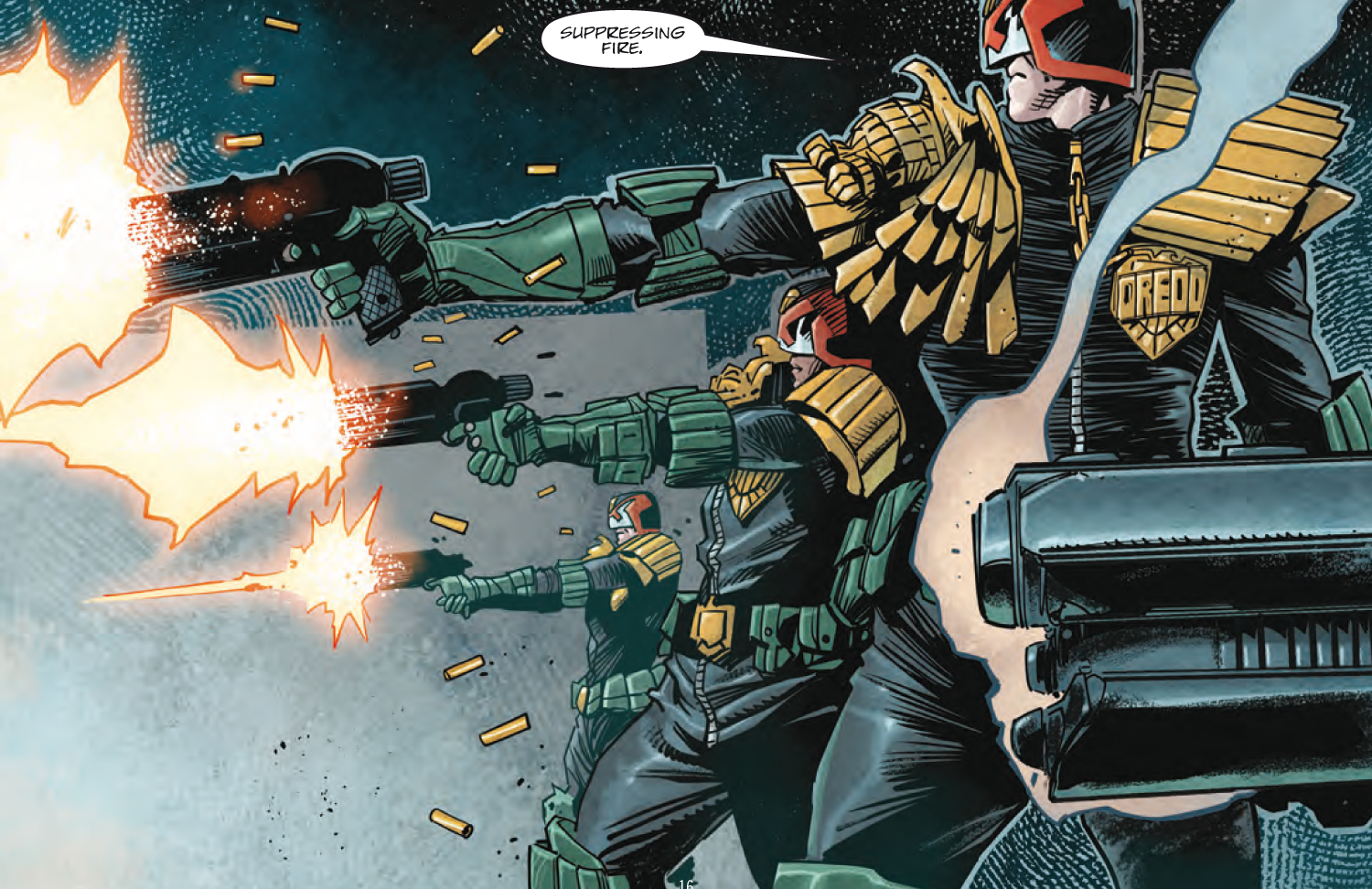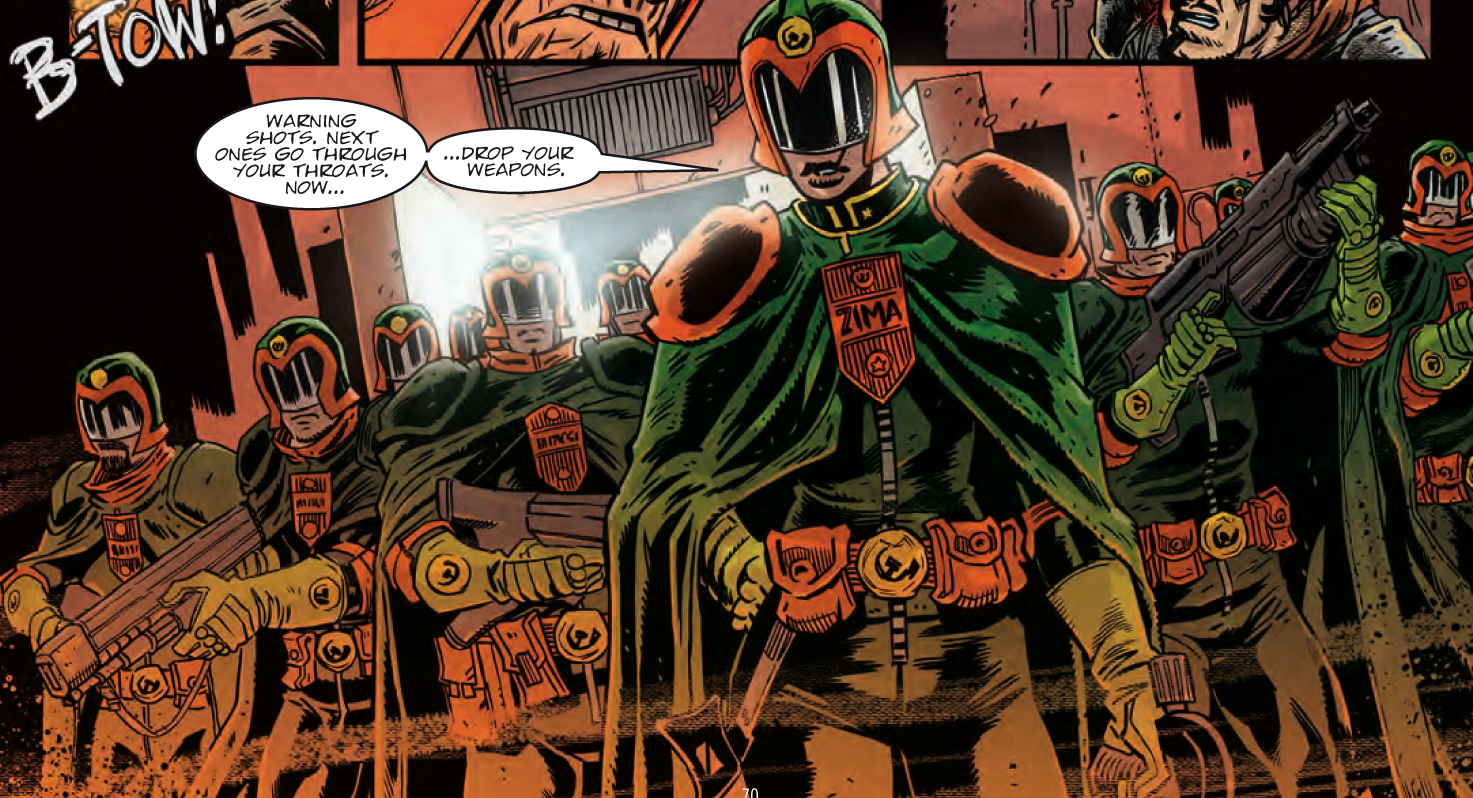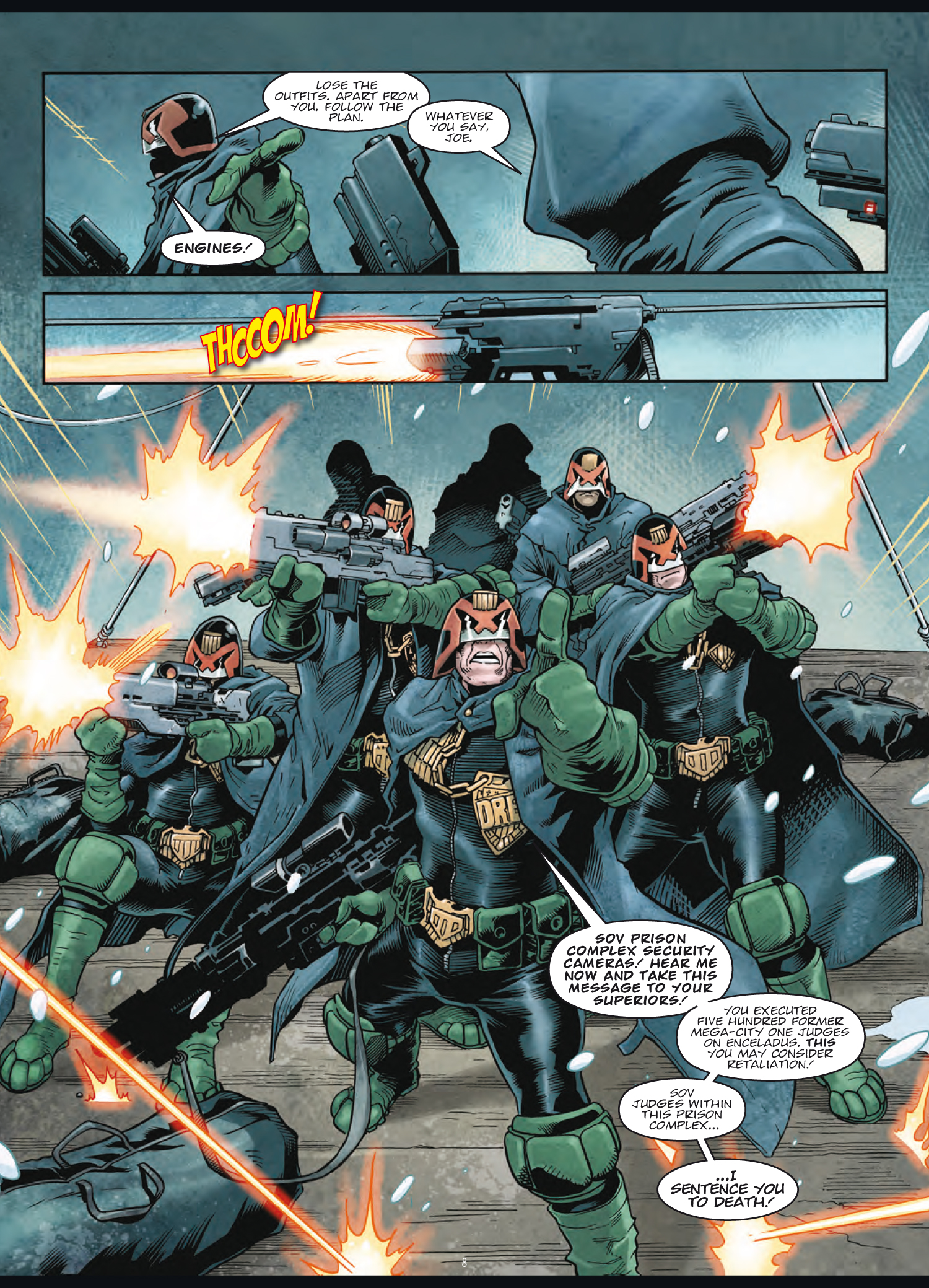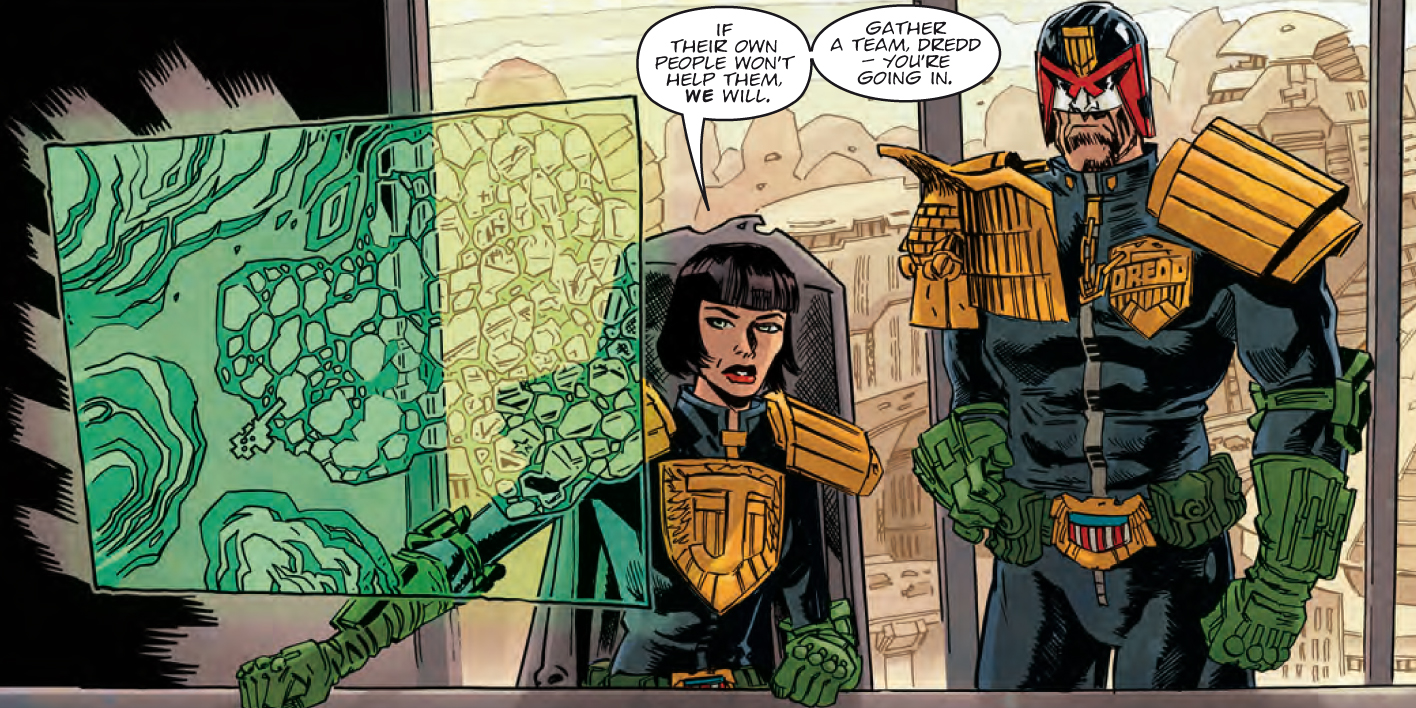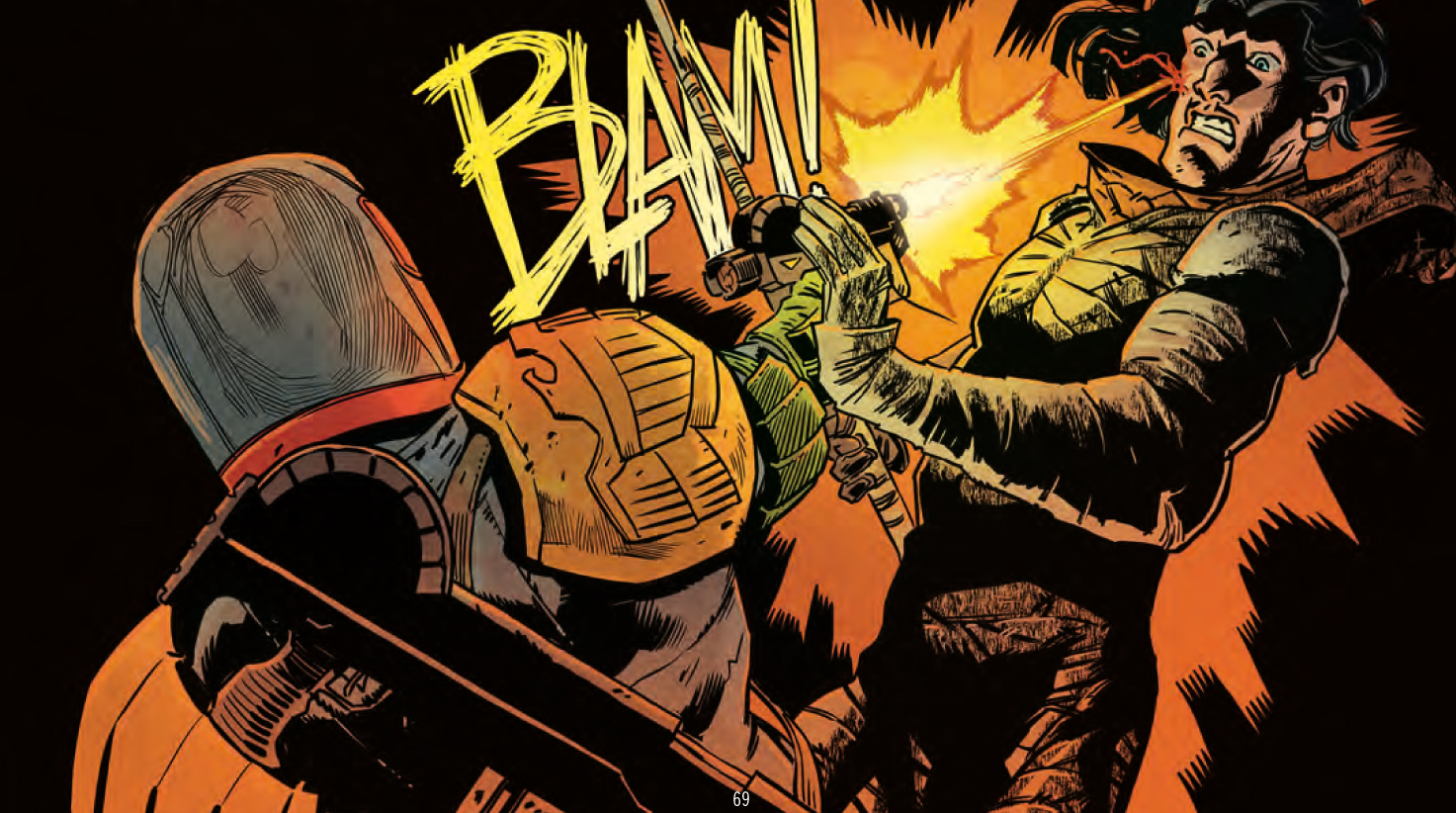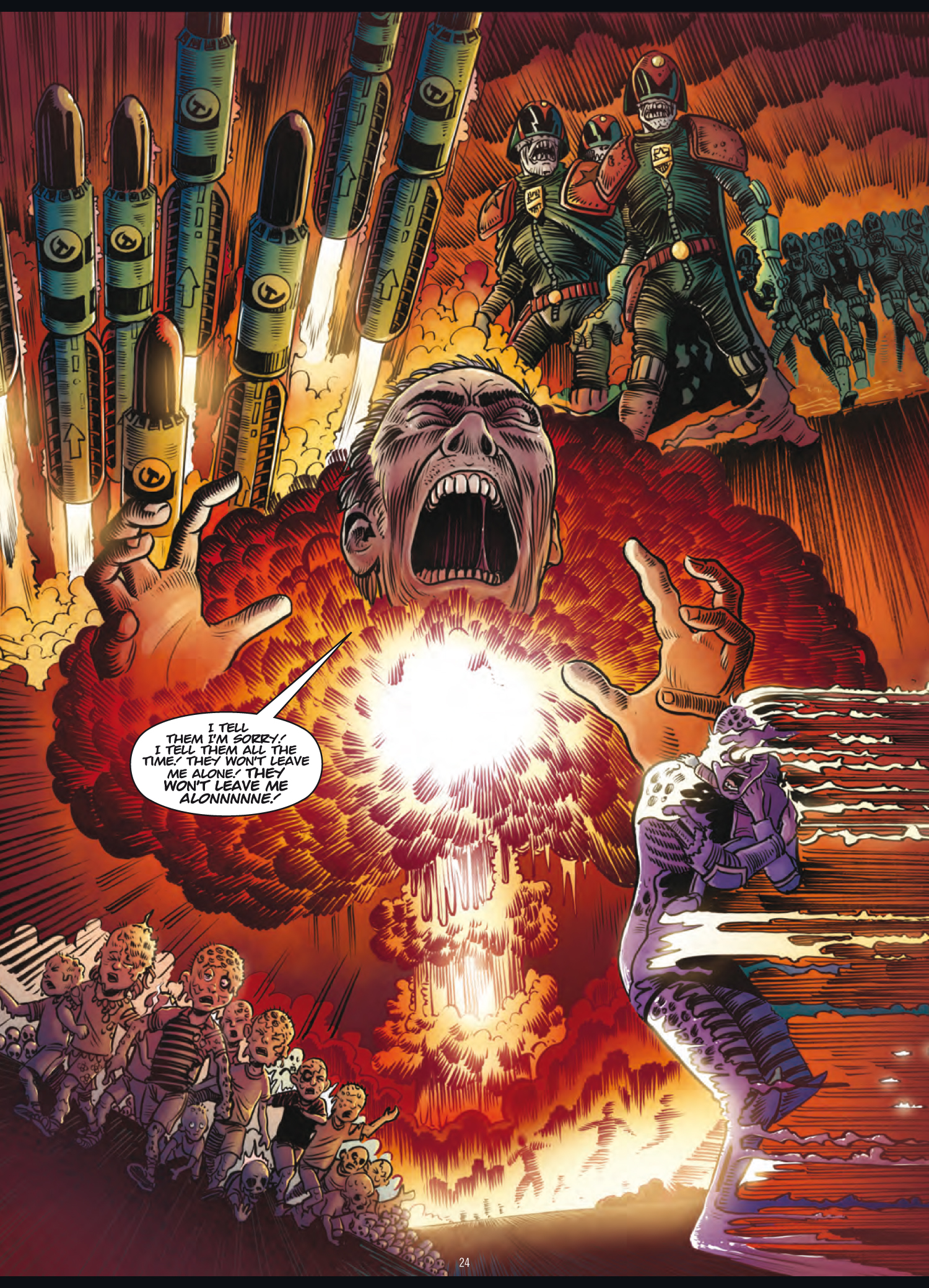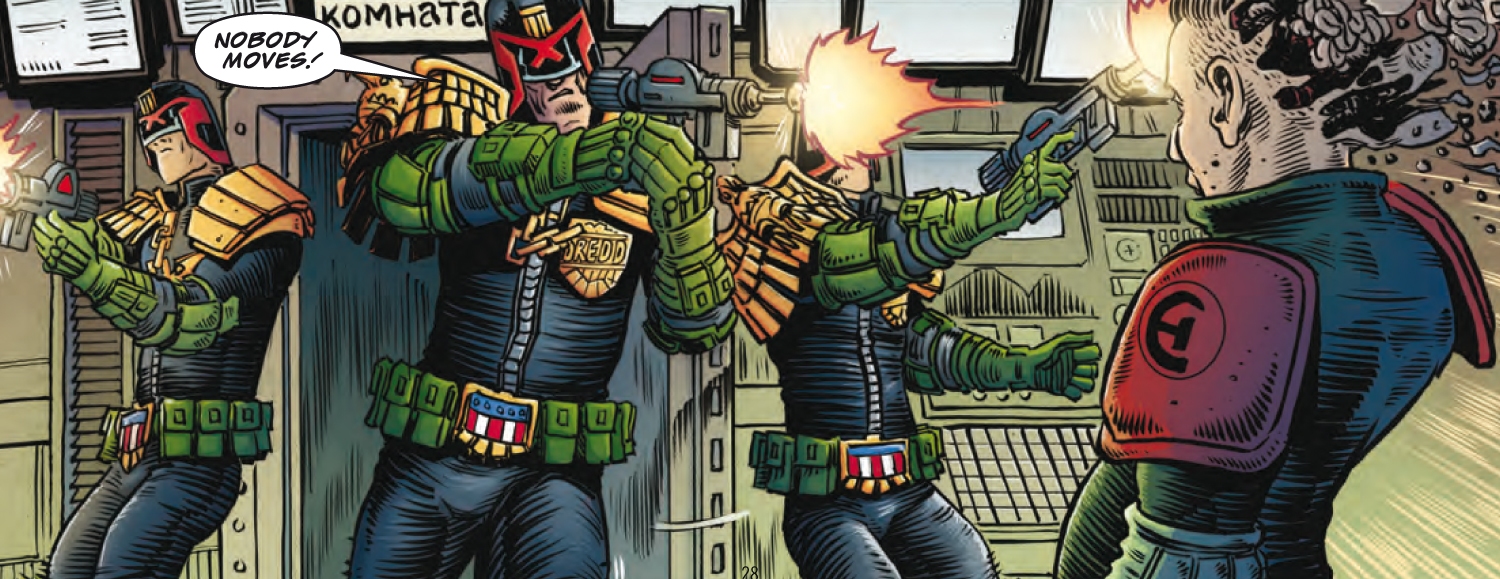Rob Williams, Michael Carroll & Dan Cornwell on JUDGE DREDD: COLD WARS
4th March 2019
East/West relations get decidely sub-zero as the action hots up in Judge Dredd: Cold Wars, which is out this week!
The spectre of the Apocalypse War is ever-present, whether it’s seeing the survivor guilt of veterans in War Buds, the brutal retaliations of MC-1 in Get Sin, or the ongoing tensions between MC-1 and the Sov Block when Dredd finds himself in trouble in the depths of Siberia.
Three writers, Rob Williams, John Wagner, and Michael Carroll – alongside breath-taking art by Trevor Hairsine, Dan Cornwell, Paul Davidson, and Colin MacNeil – tackle the memories of the past in a collection of Dredd for the future.
Richard Bruton spoke to two of the incredible writing talents behind Cold Wars, Michael Carroll and Rob Williams, as well as newcomer artist, Dan Cornwell, whose work on War Buds is his first art for 2000 AD and Judge Dredd…
Rob, Michael, along with John Wagner, you’re part of the writing team on Judge Dredd: Cold Wars. What does it mean to you both to be in such illustrious company?
Michael Carroll: I still feel like a fraud next to both John and Rob – they are among the very best in the business! They’re two writers whose work I will always read. I even bought their Rok of the Reds and Roy of the Rovers comics even though I have no love for, interest in, or understanding of football!
Rob Williams: Well, sharing narrative/book space with John always comes with that feeling of not being worthy etc. Growing up reading John’s work and then being in the same book as him is kind of collision of childhood fan me and current jaded old professional me. It’s an odd thing. He’s one of the greatest comic writers of all time. So, yeah… And Mike of course. Mike’s very much the spine of the current Dreddworld, I think. It’s fine company to be in.
One thing that does come out, when reading Cold Wars, is how, even when written by multiple writers, there’s a tightness to the world of Dredd, with the thematic connections adding to the reader’s enjoyment of the collection.
MC: It’s not really a coincidence, but neither was it planned. Our stories were picked for the Cold Wars collection because they have connections, or they’ve stemmed from similar roots. Both Rob and I are steeped in Dredd-lore, and of course John created most of it, so we’re naturally going to travel in more or less the same direction, though not necessarily along identical paths, or for the same reasons.
RW: I suspect that’s down to John’s voice for Dredd being so strong that we’re sort of standing on the shoulders of giants when we write Joe, and Matt Smith keeping everyone within tone and world-building parameters. There’s no ‘writers room’ approach with Dredd. We all individually pitch our stories to Matt and he makes sure they all fit. He’s the controlling eye over how the Dredd-world intersects, probably with the odd major world move OKed by John. Very occasionally Matt will get in touch and say ‘do you fancy doing…’ but 99% of the time it’s us pitching our individual stories and Matt nudging us in certain directions. He really does give us a lot of individual freedom.
Everything in Cold Wars evokes memories of the Apocalypse War, and I don’t just mean in Wagner’s excellent evocation of survivor’s guilt in War Buds, where the spectre of the atrocity of the Apocalypse War looms so large. In Get Sin, it’s with the retaliation and the brutality of such. With Black Snow/Echoes/The Shroud it’s looking at the fallout of the war and its impact on the Sov Block.
MC: The Apocalypse War is for me the seminal Dredd tale. Its impact on Dredd’s world isn’t something that can be easily shaken off: hundreds of millions of people died, so even though it was almost forty years ago in Dredd’s time, it still resonates. In the real world we have people hating people they’ve never met because of what their ancestors did – or didn’t do – centuries ago. That’s an important aspect of humanity that’s not going away any time soon, so it would be disingenuous for us to ignore it in Dredd’s world.
The Sovs committed an unspeakable atrocity when they attacked and invaded Mega-City One… and Dredd’s solution – to nuke East Meg One in retaliation – was arguably worse. If we scale the conflict down to, say, two neighbouring villages… Warriors from Village One attack Village Two, kill a bunch of people and try to enslave the rest. In revenge, warriors from Village Two kill every inhabitant of Village One, not just the warriors. Every one of them.
Dredd had to stop the war, and he didn’t have many other options, but there’s a cost to every action and four decades later that cost is still being paid.
RW: For me, The Apocalypse War and Block Mania is probably the greatest Dredd story in the character’s history, so nodding back to it makes total sense. Everything in Dredd is probably pre or post-the war storyline. And in Dredd nuking the Sovs, that sets up a huge amount of storyline potential, in terms of revenge, guilt, the ongoing relationship between Mega City One and the Sovs.
Rob, your Get Sin story deals with the nature of Dredd and MC-1 that, all too often, what he does, and by extension, what the powers that be in MC1 do, is brutal, hideous. Case in point, the strike team in Get Sin that are, essentially, committing mass murder of Sov Judges just to get even.
RW: From the POV of Get Sin I was really just following up a plot thread I had in ‘Enceladus’ where the Sovs slaughtered the Titan prisoners and took ex-Chief Judge Sinfeld prisoner. That needed an answer from Dredd and the Judges. Plus I got to blatantly riff on Where Eagles Dare. No bad thing.
Dredd and the Judges are often lawmen, but occasionally they’re soldiers, in an ongoing cold war. That’s the case in Get Sin. The Sovs committed an act of aggression on the Judges in Enceladus, so Get Sin is payback. No one wants another Apocalypse War, so you can get away with a commando assault like this. Just.
Also, Get Sin was me twisting Trev Hairsine’s arm to draw a Dredd again. I’ve tried manfully over the years, as he really should draw more Dredd. I think Trev’s one of the finest Dredd artists we’ve ever had.
Michael, with three tales in Cold Wars – Black Snow, Echoes, and The Shroud, all of which, effectively, form one longer tale – I see it as a look at just where the Sov Block is these days, years after the AW devastated the region. Even down to those little moments, such as the reliance on bureaucracy, the reliance on paper comms to avoid hacking – all of this plays into what’s gone before. With the world of Dredd constantly evolving, there’s an awful lot we don’t see in the Sov Block, but it’s an area you seem fascinated by. Will you be exploring more of this in future Dredd stories?
MC: I do have plans to further explore the fallout – atomic, political and otherwise – of the Apocalypse War and its aftermath. As I see it, the Sov Block is a mess. It’s the zombie equivalent of an empire… it’s been effectively dead for a long time, but somehow it’s still staggering on, causing chaos and threatening to infect the rest of the world. And the same could be said for Mega-City One, which is something I explored in Every Empire Falls. After Chaos Day, MC1 is no longer the great power it once presented itself as. It’s getting by on its former reputation, putting on a strong front without much to back that up.
I’m fascinated by the idea adherence to bureaucracy at any cost. There’s something both horrifying but compelling about a nation where a soldier will be reprimanded for insufficient application of starch to the collar of her uniform while at the same time her sibling is being sent off to the war with no ammunition because someone a thousand miles away signed the wrong box on a requisition form and no one wants to take responsibility. That’s just the Sov approach, though: in the western world, the same stuff happens except that at the end of the chain there’s a baying crowd of ill-wishers angrily and publicly demanding the resignation of a politician who was only appointed yesterday.
Finally, the Apocalypse War has never really loomed larger in recent years than now, what are your memories of that defining Dredd storyline and how would you say it’s influenced your Dredd work?
RW: As I said, it’s the ultimate Dredd story for me. The amount of times I refer to it in my stories in one form or another rather betrays that. I was at a convention last year and Chris Weston said to me ‘I think you probably need to leave the Apocalypse War alone after this story I was telling him about. Yeah. I think he’s right.
MC: If we look at the whole thing from the viewpoint of the average Sov citizen, it’s very scary… They had no control or influence over the decisions of their leaders, yet they’re still suffering because of Bulgarin’s lust for power, and because the rest of the world sees them as villains. If it’s unfair to punish someone for the crimes of their ancestors, it’s just as bad to punish them for the actions of their unelected leaders.
It’s interesting to note that forty years on Dredd is, I think, the only one still alive who had any kind of power during the Apocalypse War, and he gained that power by taking control of the resistance in MC1, then executing Chief Judge Griffin — his only surviving superior officer. That’s insurrection at the very least. Dredd rose to power through a military coup. Just like his Sov counterpart War Marshal Kazan.
So when we’re comparing Mega-City One and the Sov Block, the differences are far fewer and smaller than the Powers That Be would like us to believe: the Judges don’t follow the will of the people. The people are forced to follow the will of the Judges.
Dan, with the publication of Cold Wars, you get to see your very first Judge Dredd work in collection, as the five-part War Buds is included as part of this new collection. What does this mean to you, getting your name on a spine you can see on your bookshelf?
Dan Cornwell: It’s incredible. Really, something only a year or two ago I could only dream of. When I saw that War Buds was going to be collected I was thrilled. More so when I saw who else is in the book. Oh and that cover! Pure class. Will still be hard to believe even when I see it on the shelf.
War Buds was not only your first Judge Dredd work, but your first 2000 AD work. It was an amazing first job for the comic. I believe it was John Wagner, writer of War Buds, who put you forward for working for Tharg?
DC: Yes, John Wagner. He gave me a huge opportunity with Rok Of The Reds and believed that I was capable and of a good enough standard to work for the Prog. He encouraged me constantly through each issue of Rok and helped me improve. I think through the 130 pages of those books I was able to draw a sequential story to a good enough level to maybe get a chance at 2000 AD.
I believe John mentioned me to Tharg through an email, then at the 40th anniversary con in London Matt Smith confirmed my first gig was to be Dredd. A great weekend then became an incredible one! To get a chance and for that chance to be Dredd, well not even I imagined, or dreamt that.
As we’ve mentioned before, your breakthrough work came with Rok Of The Reds, a very different kind of football comic, written by 2000 AD legends Alan Grant and John Wagner and published by Black Hearted Press. How are things coming along with plans for a Rok Of The Reds II?
DC: The second season of Rok Of The Reds is still an ongoing work. We are going through the opportunities and working out the best possible way of bringing it to the stands. The scripts are, as you can imagine from John Wagner, incredible and funny. I’ve completed the first issue and the rest will come soon.
Since Rok and War Buds, how’s your life changed?
DC: Rok and War Buds have changed my life. I’ve been able to finally give up the day job, go freelance and draw comics for a living and I’m loving every single minute of it. It’s a massive change and challenge but I’m determined to make it work. The fans have been amazing as have friends, family and everyone. I’m a very lucky boy.
Drawing Dredd was always the dream for me and to have been able to do that on multiple occasions is mind blowing. I’ve got a Rory McConville two-part Dredd coming to the Megazine soon and I’m currently working on a 10-part Max Normal story with Guy Adams. All coloured by Jim Boswell.
Frankly, I would draw anything for 2000 AD given the chance. Rogue Trooper, ABC Warriors, Sláine…. jeez I could go on and on. They’re all so iconic now. Doing anything for the Prog is living the dream.
________________________________
Judge Dredd: Cold Wars is out this week from all good book and comic book stores, as well as from 2000 AD‘s webshop and apps!

